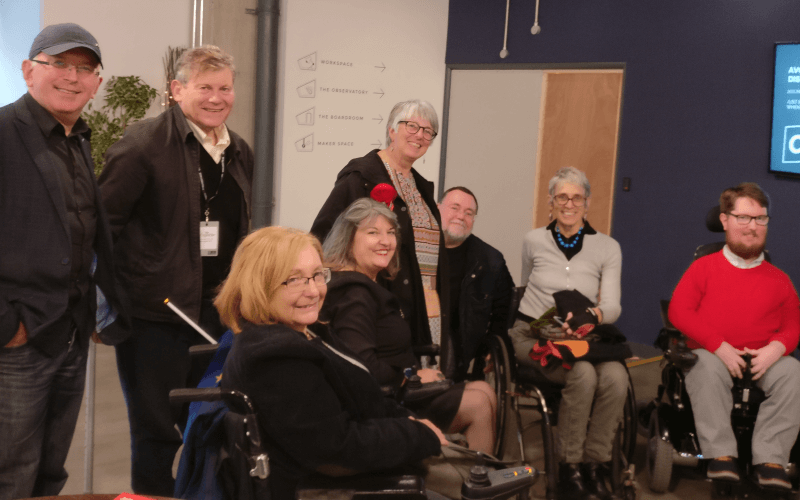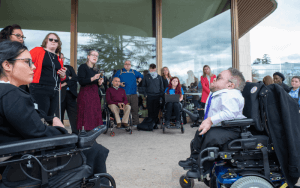Disabled Labour supporters have described some of the ways in which left-wing activists could push back against years of government austerity, oppression and attacks on inclusion.
They were speaking at two events taking place on the fringes of this week’s Labour conference in Liverpool, both organised by disabled researchers and campaigners Dr Paul Darke and Miro Griffiths.
Griffiths told one of the fringe events that he believed there was a need to “build stronger alliances and bring more disabled people into our activities, our activism”.
He warned that disabled people had “normalised” and “absorbed” the oppression and marginalisation they were experiencing in society and now saw it “as an everyday occurrence”.
He said: “What the government has done very clearly, in its policy and its rhetoric, is to say that if you experience marginalisation then it’s your fault. You take individual responsibility for it.”
Griffiths said activists and campaigners needed to think about how they could “politicise people’s everyday experiences”.
He said that the problem faced by those on the left was the lack of an alternative vision to the one presented by right-wingers, who had “manipulated and taken over the vision and it is one of desperation, it’s one of fighting each other, of equality groups fighting each other for essential resources”.
He said there was a need for more disabled people’s assemblies, more user-led organisations, and political parties to fund and provide resources so activists and campaigners “can have that space to decide what is our vision”.
Pam Thomas, a “radical disabled socialist and activist” who is now a city councillor in Liverpool and the council’s cabinet member for an inclusive and accessible city, said it was “really important for disabled people to become involved in politics”.
As a member of the regional transport committee, she has been able to use her influence to ensure that a new order of trains for the underground service will be a model that she can board and exit “on equal terms with everybody else”.
As a result, the new trains will be the same height as the station platforms, with a sliding ramp coming out from the trains to meet the platform and allow level access for wheelchair-users.
Work is being carried out across the underground network to ensure that platforms will be the right height when the trains are available from 2020.
The system, she said, would be more accessible than London’s and will be “probably the most accessible system in the country”.
She said: “That would not have happened if I had not been on that committee, so it’s really important for disabled people to get involved in politics.”
Thomas said she welcomed the “move to the left” across the country but was “not convinced that things are going to be any easier for us in terms of being included and being taken account of”.
She added: “There are still very many non-disabled people who do not have a clue… they really do not know the kind of barriers we encounter.”
About 100 people attended a second event hosted by Darke and Griffiths, this time as part of The World Transformed, a festival organised on the conference fringes by the left-wing movement Momentum.
Darke told the event that he believed there was a need for a “radical transformation” of an organisation like the BBC, which he said was guilty of “woeful” levels of expenditure, coverage and inclusion of disabled people, and needed a huge increase in the proportion of its staff who identify as disabled people so it becomes “truly representative of the country”.
And although he was opposed to the existence of the House of Lords, he said there needed to be more disabled peers so that “their voice is heard” and disabled people do not have non-disabled politicians speaking for them.
Darke said at the earlier fringe event that he believed that “society hates disabled people”.
He said that “normal people… hate themselves, so the idea that they are going to be progressive towards us is not really going to happen”.
He said their identity was “so fragile” that they “reject and fear difference to such a degree that they flail out with ignorance and hatred, marginalisation and discrimination”.
Darke pointed to the example of Denmark, which is seen as a progressive, liberal society and an ally of Britain but has boasted that it wants to eliminate Down’s syndrome within a generation, a wish, he said, that “Hitler could only have dreamed of”.
He said afterwards that the only hope for opposing the current “neoliberalism and utilitarianism” of the right – which “sees no value in disabled people” – was through the politics of the left.
But he said that even those on the left either do not understand or do not care about disabled people and “don’t allow us our voice”.
Griffiths told the Momentum event that there were frameworks in place through the UN Convention on the Rights of Persons with Disabilities that showed “how to realise inclusion of disabled people”, but the “reality on the ground is nowhere near reflecting that”.
He said the government had a “complete disregard for the lives of disabled people”, which it demonstrated in its “dismissal” of the UN’s repeated concerns about the UK’s implementation of the convention.
Much of the current activism, said Griffiths, was “in the here and now”, with disabled activists “trying to prevent the violence, the destruction of life, the further institutionalisation and marginalisation”, and was therefore stuck in “crisis-driven agendas”.
He said: “We don’t have enough of a vision of what we mean by a safer, inclusive, accessible environment and society.
“Where is the vision we can offer to everyone to say ‘this is what society should be built like’?
“The right continue to fragment us, to take away resources, so we end up fighting each other.
“Disabled people’s experiences illustrate how it is so easy to roll back on the advancements that have been gained by activists and groups, because our social justice and human rights are conditional, they are based on whether they meet the economic and political objectives of the state.
“So we cannot just rely on rights, we also have to have a vision, a vision that we can offer to other people.”
Disabled campaigner and consultant Richard Rieser said he agreed with Griffiths and said that the “strength of the movement determines what rights we get”.
He said he wanted to see the development of an organisation that could provide “one voice for disabled people” in this country, while there was also a need to build a representative “mass movement” internationally.
He said there was no point the UN saying that access was a fundamental human right – which it does through the disability convention – if disabled people do not have the political strength to implement that right.
He said: “We have to build the strength both here and abroad.
“It seems to me that the time has come to have that discussion about how we rebuild our movement.”
Ruth Gould, artistic director of DaDaFest, which is holding its international festival showcasing disability and D/deaf arts from 1 November across Merseyside, told the first fringe event that she was often asked whether holding a “separate” festival risked perpetuating a disability “ghetto” when disabled campaigners were calling for society to be more inclusive.
But she said: “We are a cultural sector that is strong and vibrant. But to me it is not about ‘them and us’, it’s about ‘us’.
“We as disabled people have something really strong to say about our lived experience of disability.”
She questioned why disabled people – the “second largest minority group in the country, after men” – did not do more to acknowledge and express our own culture, as other minorities do.
Such artistic expressions “affirm our life experiences”, give disabled people a voice, bring them power and influence, challenge the messages in the media and “allow us to say and express the things others would prefer us to keep hidden.”
*This week, DaDaFest announced its line-up for this year’s international festival, with more than 50 exhibitions, performances, talks and workshops between 1 November and 8 December across the Liverpool city region.
Performers will include comedians Francesca Martinez and Laurence Clark, theatre-maker and comedian Jess Thom, Stop Gap Dance Company, artists Faith Bebbington, Jonathan Griffith, Simon McKeown and Martin O’Brien, and multi-instrumentalist Sarah Fisher.
They will all explore the concepts of ageing, death and disability, and “the changing nature of all our journeys and the legacies we leave”.
The festival will also commemorate the end of the First World War as “a key moment for modern recognition of disability as a social construct”.
Picture: Speakers at the first of the two fringes, including Richard Rieser (second from left), Pam Thomas (third from left), Ruth Gould (fourth from left), Miro Griffths (far right) and Paul Darke (third from right)
A note from the editor:
Please consider making a voluntary financial contribution to support the work of DNS and allow it to continue producing independent, carefully-researched news stories that focus on the lives and rights of disabled people and their user-led organisations.
Please do not contribute if you cannot afford to do so, and please note that DNS is not a charity. It is run and owned by disabled journalist John Pring and has been from its launch in April 2009.
Thank you for anything you can do to support the work of DNS…

 Seven years on and no progress on disability rights by UK government, says UN
Seven years on and no progress on disability rights by UK government, says UN UN’s ‘damning verdict’ is ‘vindication’ of fightback against government’s rights violations
UN’s ‘damning verdict’ is ‘vindication’ of fightback against government’s rights violations Trio of mayoral candidates show ‘contempt’ by snubbing disability hustings
Trio of mayoral candidates show ‘contempt’ by snubbing disability hustings